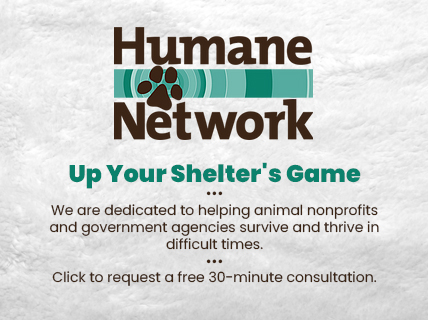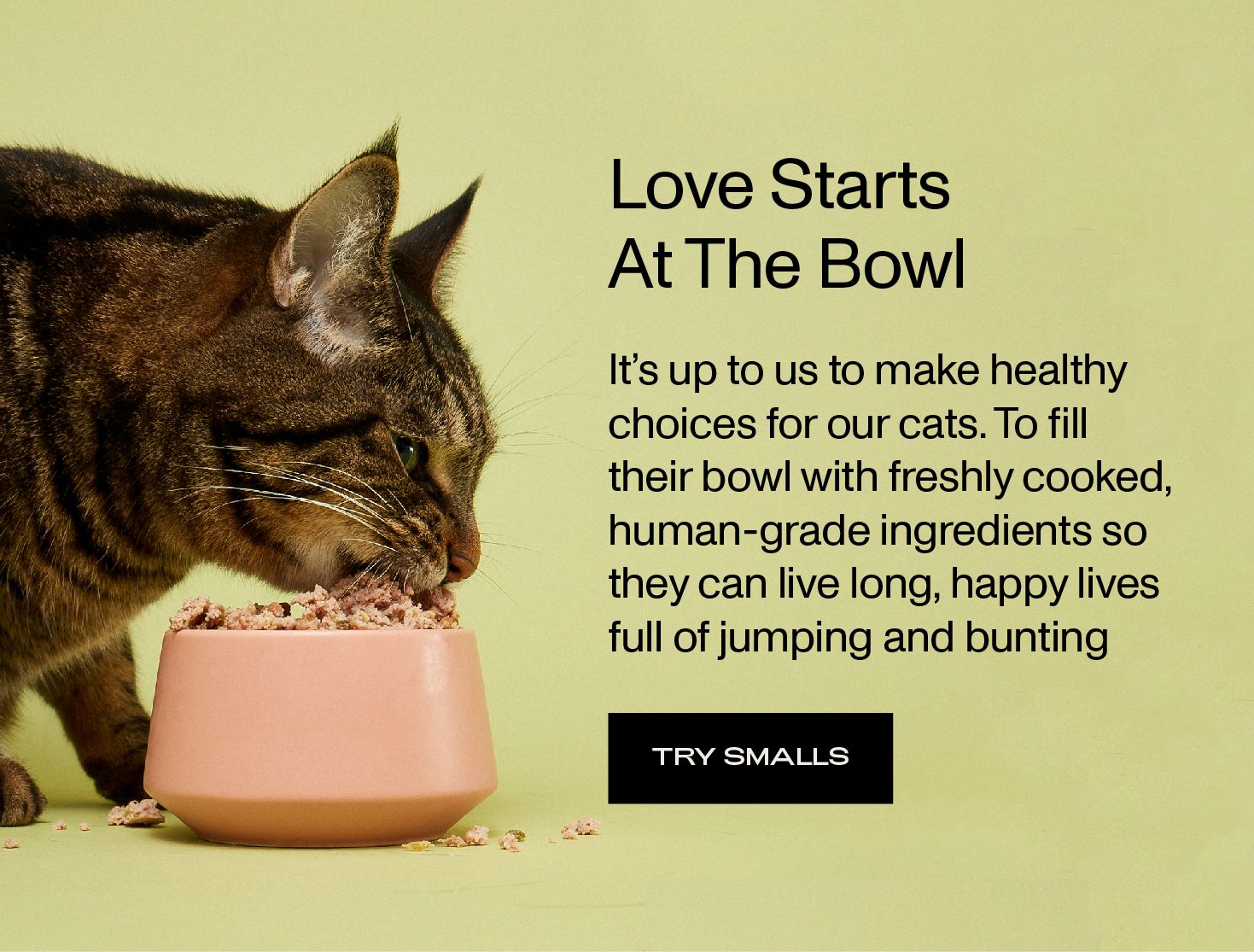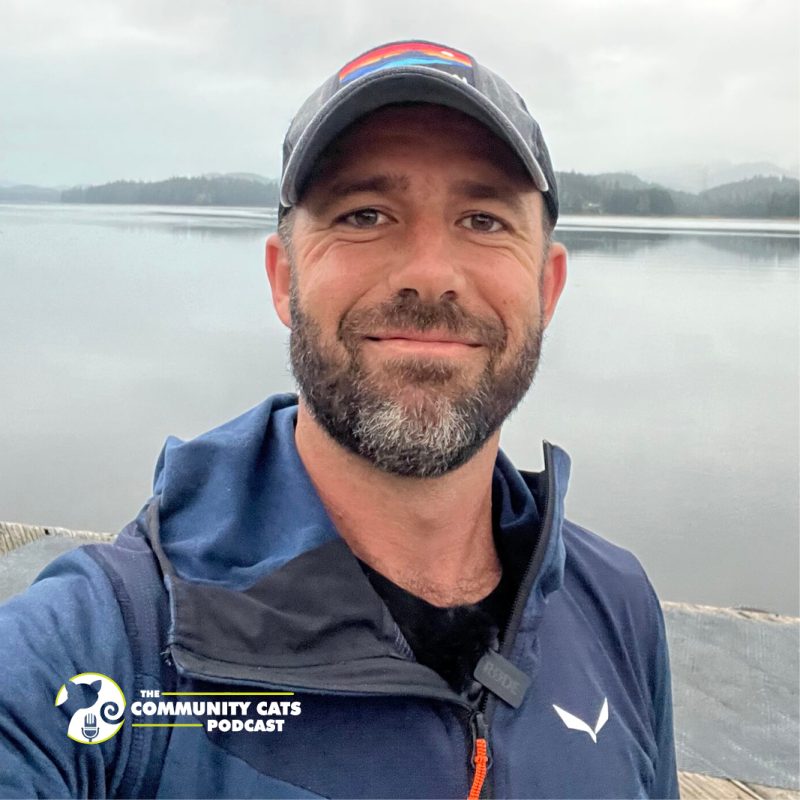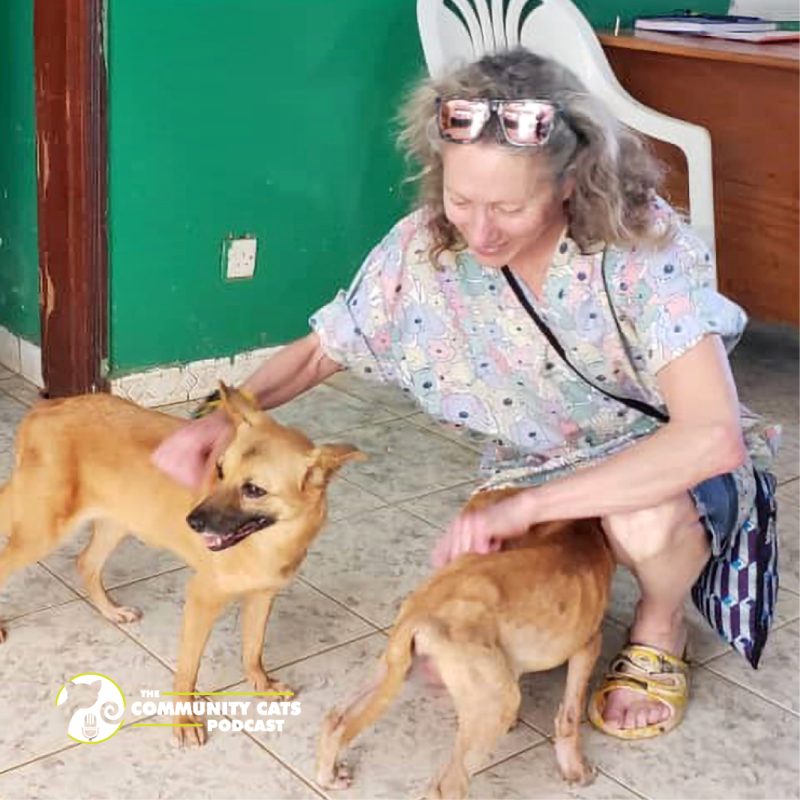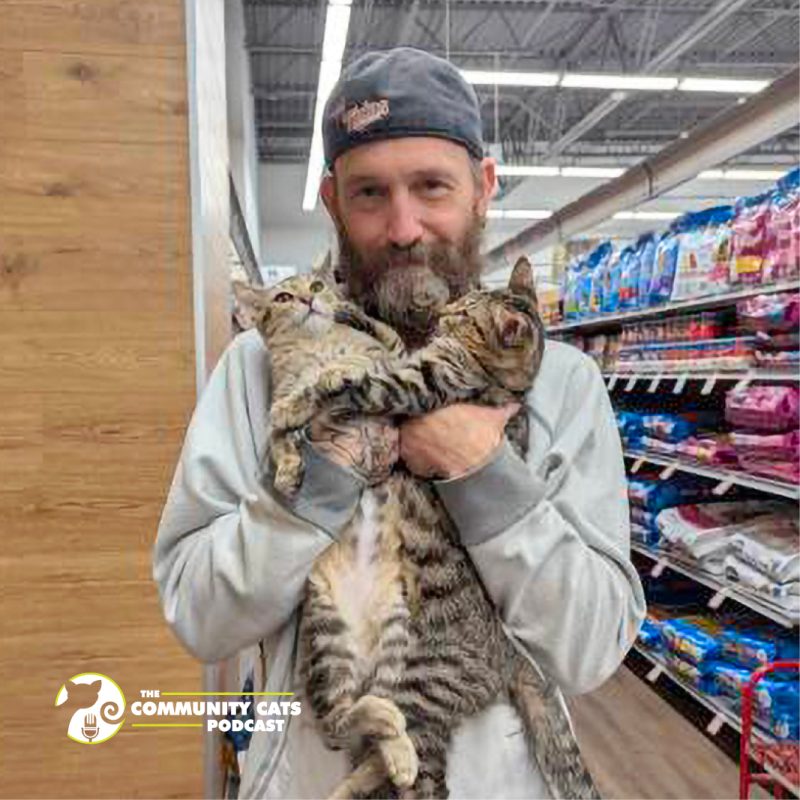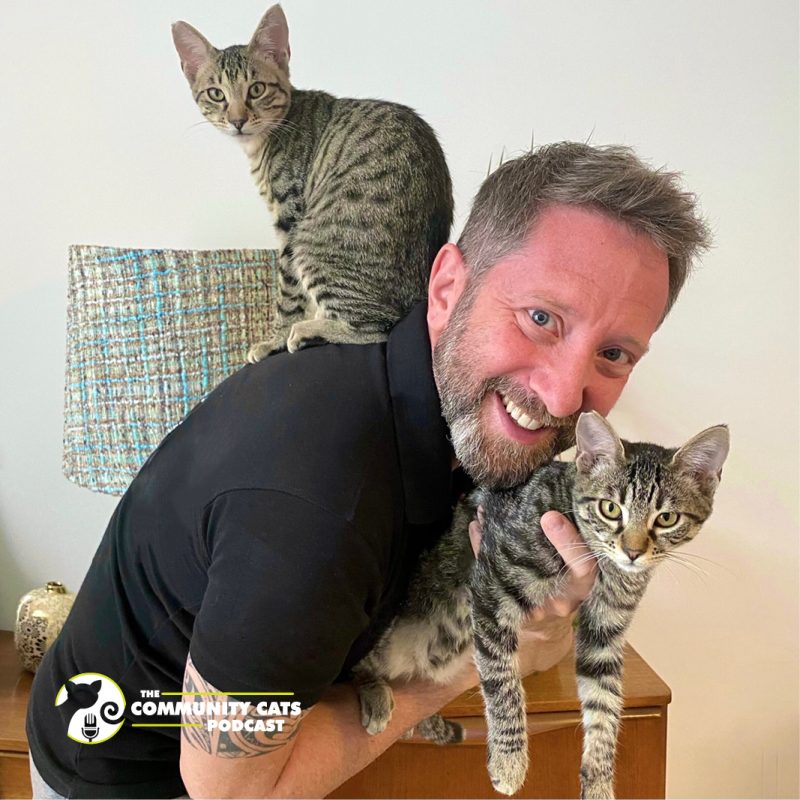
A Community Cats Grants Program Update: Group 12 Saved the Day
January 13, 2022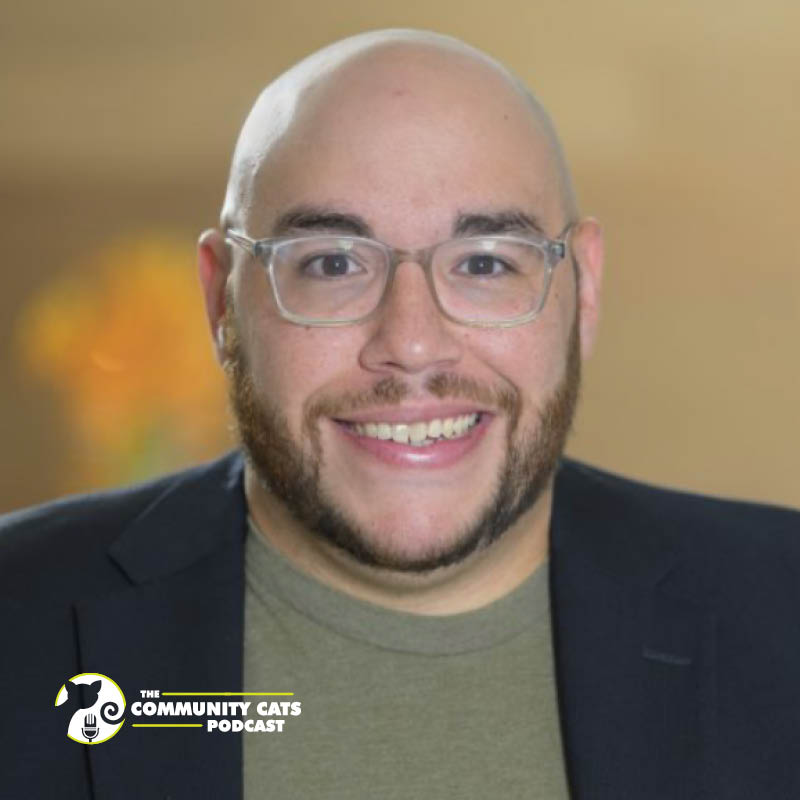
Michael Bricker, Chief of Engagement of Companions and Animals for Reform and Equity™ (CARE)
January 25, 2022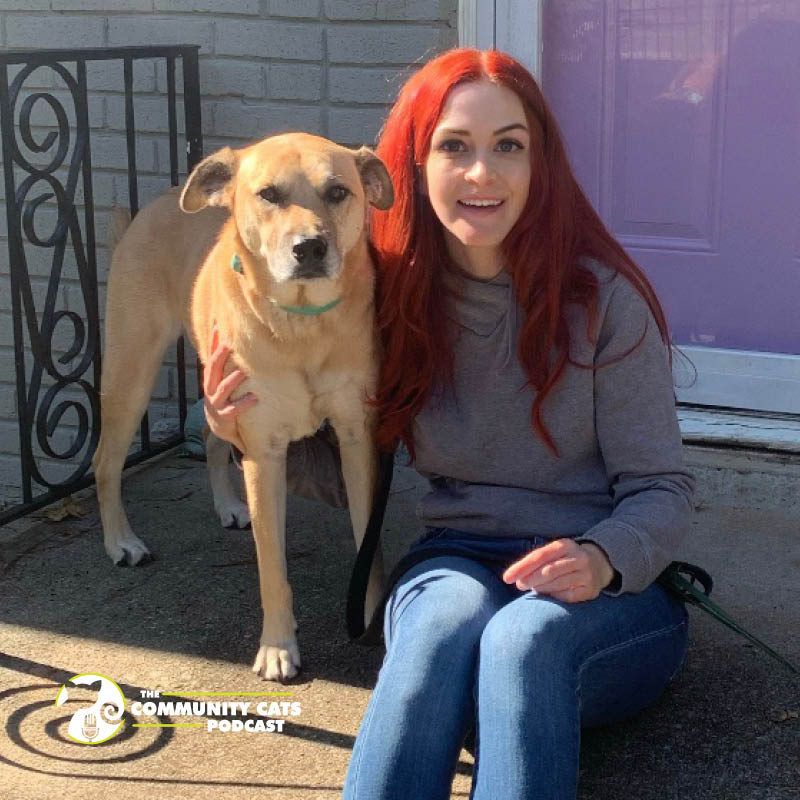
“When people are facing these major illnesses…they are unable to get the support they need to care for their pet and they’re not ready to rehome them either…they count on that comfort.”
Listen to Episode #439 Now
This episode is sponsored in part by Humane Network, Doobert.com and Maddie’s Fund.
Turning her perspective around on being a single pet caretaker inspired Beverly Means to think about what kinds of help she would want if she could no longer care for her pets due to terminal illness or an end-of-life event. After looking for options in her community, Beverly saw the need for supportive services around this common problem, and Transitions Pet Care was created.
Offering services from estate planning to rehoming options, and even supportive pet care in Decatur, GA, Transitions Pet Care is a 501(c)3 foster-based rescue. TPC serves a population of elderly, health-compromised, or terminally ill people and their pets.
Stacy and Beverly discuss estate planning with our animal companions in mind. Beverly outlines options from a formal and legally-binding Pet Trust to an informal written plan including care details, veterinary info, and the pet’s own preferences. She emphasizes the importance of planning for animal companions, especially with multiple pets or even a colony of community cats on your property.
“It doesn’t take that long to have the conversation, to write it down, and to share it with the person who may be managing that,” she advises.
As a trained social worker Beverly is uniquely prepared for navigating the emotional hardships that come with this work and she believes in preparing volunteers of the program for the loss and grief that comes with helping the population they serve.
“At the end of the day, it’s about helping people take care of their pets in a way that helps them keep their pets and keep that pet healthy.”
Learn more about Transitions Pet Care by visiting them online, or by following them on Instagram.
Read Episode #439
CommunityCatsPodcast_Ep439_Means_220118.mp3
Kristen Petrie [00:00:03]
You've tuned in to the Community Cats Podcast. Ready? Let's go.
Stacy LeBaron [00:00:13]
Welcome to the Community Cats Podcast, I am your host, Stacy LeBaron. I've been involved helping homeless cats for over 20 years with the Merrimack River Feline Rescue Society. The goal of this podcast is to expose you to amazing people who are improving the lives of cats and I hope these interviews will help you learn how you can turn your passion for cats into action. And today, we're speaking with Beverly Means. Beverly is the founder of Transitions Pet Care, which is a non-profit in Atlanta that provides pet care and rehoming services for the pets of people facing the end of life. Her organization also seeks to educate all pet owners about the importance of creating plans for pets in the event that the owner passes away or becomes incapacitated. Over 500,000 pets enter the shelter system after an owner dies. It's a huge problem and there's a simple solution. Beverly. I'd like to welcome you to the show.
Beverly Means [00:01:07]
Thank you so much for having me. I really appreciate it.
Stacy [00:01:10]
Sure thing. So, before we dive in and find out more about Transitions Pet Care, let's find out how you got to be so passionate about cats.
Beverly [00:01:19]
Well, I grew up being more of a dog person, I have to say, but I did happen to get my first cat when I was 17, and I know It sounds kind of silly but once I figured out how much different they were from dogs and learned to love them as they were and not like, “Oh, that's not a dog. It doesn't act like a dog,” but learn to appreciate the way they show affection. And the way they like to interact with humans. I became a lot more passionate about them. And I have two cats now that I just absolutely love: one is an orange tabby and he just brings me so much joy, he sleeps next to me every night and my other little kitten Zoro, he's so much fun to watch, he plays with my Chihuahua. I just love cats’ personality and I love the challenge of them. And I feel like you really earn your relationship and the love from a cat, so I appreciate them. I guess I should say I just appreciate them.
Stacy [00:02:21]
That's great. That's wonderful. I mean and you definitely have a sense of them as different beings than dogs, you know, in terms of their needs and how you communicate and relate with them.
Beverly [00:02:31]
Yeah, absolutely.
Stacy LeBaron [00:02:33]
So, tell me a little bit about Transitions Pet Care. I really want to take a deep dive and take enough time to understand your nonprofit but also, you know, the situation that that we are facing with people not really taking the time to plan for their pets at end of life and so, you know, maybe there was a discovery process in there. I just, you know, share with our listeners like how did you get to Transitions Pet Care.
Beverly [00:02:58]
Well, we just started last year and I know it's not the best time to start a business during a pandemic. But once I came up with the idea, I couldn't get it out of my mind. You know, I just became obsessed with it. And the way I came up with it is I'm a single person and I have some pets and I was kind of one of those moments that sometimes a single folks have where we're like, “Oh man, I really am going to end up alone,” to turning it around to more of an empowerment moment where I was like, “Well, if I'm going to be alone, I need to make sure I have all my arrangements made and my pets are taken care of.” And so I started just thinking about if I got sick what kind of services I would want to help me care for my pets and that's how I came up with the idea to provide pet care for people because I didn't see that as a service that was being offered free, you know, to people who may not be able to afford private pet care long-term. And then I thought well if you know, so that takes care of being able to keep my pets but once I pass away, you know, I don’t want to have to worry about them going to a shelter. So, then I thought well, there should be a rescue component to it too, because who better to help you re-home your pet, than the person who's been helping you care for your pet. And then I thought, well, you know, the third component of that is the plan and I was thinking, gosh, there's so many people that I know personally that don't have a written estate plan for their pets if something were to happen. And I started Googling around about it even more and that's when I discovered just the sheer number of pets that enter the shelter system because there wasn't a plan and one of my dogs actually I got because his owner passed away suddenly. So I really thought that was an important education component to add to the services that we were providing as a way of reaching out to all pet owners and not just those who are elderly or some kind of major illness.
Stacy [00:05:01]
So, you know, in terms of thinking this through, and a lot of our listeners, in addition to the cats that they have, cats and dogs, many of our listeners might have dogs and I will say that's okay. They also make are for colony cats or community cats, you know, and feed cats in the backyard of their houses. And actually, I've read some stories recently of people putting their houses for sale or somebody passing away, but there's some community cats in the backyard and because the markets been so hot, real estate wise, they've been able to sell the house with the condition people will take care of the cats, you know, in the backyard, which is amazing and wonderful, but, you know, what are the kinds of things when you're talking about planning, you know, it's not like planning the cat carrier and the cat food for when the hurricane comes. What kind of planning are you talking about?
Beverly [00:05:53]
Well, you know, there's a couple things that people can do. The most formal type of plan is a pet trust and I know in the state of Georgia here in the United States, that's only somewhat recent that people in this state have been able to do. But that is the most formal legally binding type of plan that you can create for your pet that would also allow you to leave funds for their needs, but for people who don't want to pay for an attorney and don't want to go through that process, a real simple easy quick and free way is to just have an informal written plan, where they include contact information of, you know, who the vet is, the type of food, when they give the flea medication or heartworm preventative, all those important care instructions and also pet preferences; are they kid friendly, cat friendly, dog friendly, that kind of stuff, and share that too. So sometimes, you know, people say, well, I'll write down that I want my nephew take my dog, but if they're not talking to the nephew, you know, they don't really know that he's going to be willing to take their pet. And a lot of times people will think, “Oh, this person will take their pet,” and that's the person who ends up calling my rescue because at the end of the day, they didn't really want the animal. So I say also share that plan. Make sure the person who would be managing your affairs knows what your wishes are. And yeah, don't just write it down and stick it in a filing cabinet somewhere and don't just hope that somebody is going to take your pet because that doesn't work. Those are the people that end up calling me sometimes and also when they do call me, that ends up being the most stressful part, it's not so much selling the house or what to do with their old furniture or anything like that, it's figuring out what to do with their cats, or you know, goodness gracious, they have a colony of cats, you know, what is, what is your family going to do? You know, so just being really mindful and it doesn't take that long. That’s the other part about it is it just doesn't take that long to have the conversation, to write it down, and to share it with the person who would be managing that.
Stacy [00:08:09]
What should we do if we feel like there's nobody in our family, our friends, you know, that really wants the job? And maybe we do go out and we start asking and say, you know, hey, I have five cats, I have seven cats, I have two cats, but we just can't seem to find anybody who wants to take on that responsibility to take care of our pets, you know, if something were to happen to us. Is there an organization we can turn to or are there, you know, some advice for us when we're kind of lost?
Beverly [00:08:42]
Right, and that's a great question because if you're limited on your options, the only option shouldn't be the option that you always take, right? So, we have, we had, I know this is about cats, we had a dog come into our rescue, who the lady left her dog to her, son, who abandoned the dog, right? And it was only because she didn't have anybody else to give the animal to. So, if you don't have anybody in your network to leave your pet to that, you who (a) would want your pet or pets or two would take good care of them then I would suggest reaching out to rescues in your community and finding out which ones would be willing to take your pet. If you left them in a will and I would strongly suggest leaving a donation too. And talking to those rescues, they might require or ask for a certain amount to be able to care for your pet. I know for us for, Transitions Pet Care, what we're hoping to do in the future is to have a really lovely sanctuary where people can leave their pets to us and know that they're going to be in a very beautiful place well taken care of. So there's other organizations that offer that too.
Stacy [00:09:57]
Yeah, and there are interesting ways of thinking about it. When I was at Merrimack River Feline Rescue Society, we had a person who passed away and they had like 12 cats in the house and so they had a pet trust with trustees and the cats were allowed to live in the house. They had a tenant renting in the house, so that someone was living with the cats, but there were concerns that maybe the cats weren't getting, you know, the attention or the care or, you know, so there's the thought about, well, is it better to have them go to the adoption organization or stay in that house but yet still try and find a rehoming option for them rather than having them being in a house that might be, you know, empty of human contact for, you know, whatever 12 hours a day if this person's commuting and maybe not as committed. So there were some issues, the trustees had to kind of break into and we were asked to try and rehome the last three cats that were in the house. And then there's also the scenarios of you as you were talking about sanctuary versus, you know, rehoming or adopting so that there's some components in there to think about, you know, as to what you're looking for, you know, for that next life for your cat when you're thinking about your own house cat. Now, community cats that you're feeding in the backyard, I think that's more of a neighbor to neighbor type conversation to see if you would have some neighbors that would be willing to move a feeding station over or shelter over into their property or whoever's taking over the property would be willing to take on that colony, which it seems to be a seller's market these days and people are willing to do that, so families should be feeling comfortable and willing to ask that. But there's there is no set plan, there's a lot of creativity out there and it sounds like you've seen that too. Just to be clear, so when somebody you, you also, you do rescue and rehoming service is so right now, so if somebody does pass away and maybe they don't have options or they get in contact with you and you take the cat or the dog in in foster care, or do you not? Do you have a facility or is it just foster care?
Beverly [00:12:19]
Right now, we're just a licensed foster-based rescue so we utilize our foster home. So with that, you know, our capacity is based on the amount of people willing to open up their homes to the cats that we serve and the dogs, but, you know, the cats, it can be definitely a challenge because you know, people have cat allergies. But yeah, we're foster based.
Stacy [00:12:43]
And in terms of the cats and dogs that you are taking in, are they on the older side or are they all kinds of ages that they don't have disease issues? I would assume while they're in foster care, you're willing to take care of their medical expenses and their food if necessary, if the foster homes not willing to do that and maybe I'm wrong, you can correct me on that. But I’m just wondering if the cats and the dogs that you are taking care of, if there are younger or on the older side
Beverly [00:13:12]
Because of the pet owners that we serve, which are those who are terminally ill or have a chronic illness, the animals tend to be a little bit on the older side because people typically don't go out and get a kitten or a puppy when they have a major illness or when they get the terminal diagnosis. So, they are a little bit older and actually I'm glad you brought that up because one of the reasons why our pet care service is so important is because what we're learning or what we learned from the rescue side is that when people are facing these major illnesses, a lot of times they're not able to get the support they need to care for their pet and they're not ready to re-home them either, which is understandable. They count on that comfort. So what happens is that pet doesn't get what they need, you know. I brought in a cat that was completely flea-infested because the owner, she couldn't get the cat to the vet or to the store to get the flea medication. She had stage 4, breast cancer, and very limited support. And we've had other pets come through that have active infections that weren't on medications that they needed to be. I mean one dog, unfortunately, went over a year without his seizure medication just because the owner didn't have that support. So, so yeah, we are seeing that those kind of issues that were hoping to prevent through the pet care program, just make sure, you know, the cats especially, especially, like you're saying with the colony cats and just people who have a lot of cats in their home, making sure that they each get the care that they need. And yes, once they do enter our foster care, we make sure that they're seen by vet, that there are medications that they need, that they're checked for heartworms, they’re on flea preventative, microchipped, spayed, neutered, all that.
Stacy [00:15:09]
And your hope is that some of these folks that are planning for their pets, you would get some donations to help support that or you actively doing fundraising also to help support these costs?
Beverly [00:15:22]
So far, you know, as we've gotten started, we've had a lot of great and very generous donors just believing in what our concept is. And we do ask for donations, you know, and we do have our pet owners who surrender the pets to us. A lot of times they'll donate to just say, hey, I can't care for my pet anymore. But I want to make sure I can still in some capacity, make sure that their needs are met or families have done that to made a donation to help, make sure that they get the care that they need.
--Start mid-roll advertising-- [00:15:56]
We interrupt this podcast for a quick trivia question. Where's the single place with answers to all of your animal welfare questions? Yes, even the one that kept you awake until 2:00 in the morning. Anyone? Anyone? Bueller? It's Maddie's Pet Forum. Maddie's Pet Forum is the only dedicated forum for our industry where you can find answers from colleagues fast and free. Stop doom scrolling and join today. Visit forum.maddiesfund.org/cats.
[00:16:26]
Could your animal welfare organization use a tune-up? Humane Network can help. You can get a free 30-minute consultation to talk through your challenges and get ideas on how your organization can be more successful with less stress from board development and fundraising to strategic planning and operations. Humane Network has got you covered whether you were a large or small nonprofit or government. It's a live and thriving program led by a certified animal behavior consultant. Features specially designed training for shelter and clinic staff on enrichment, stress reduction, safe, animal handling, and behavior modification. With Humane Network, you receive individualized advice and support customized to meet your organization's unique needs, and Humane Network can lighten your load by taking on fundraising communications and other tasks you struggle with. Contact Humane Network today for a free 30-minute consultation. Visit humanenetwork.org. That's humanenetwork.org.
[00:17:21]
A simple picture of an animal and foster or needing adoption just doesn't cut it; adopters want to see video of the animal in action showing off their personality but shelter software doesn't let you get video back from fosters or staff easily. They can't text it because video is just too big and posting to YouTube means you have to give them access. If only there was a way for you to get video back from anyone that you can use in your organization. Luckily the team at Doobert has solved this problem with their RescueTUBE module. Now you simply create a bucket and give that code to any of your staff, volunteers, or fosters to type into the Doobert mobile app. They can easily upload videos up to 10 minutes that you can easily download and use in your adoption efforts. Organizations across the country are using Doobert’s RescueTUBE to capture video of foster animals, adoption, events, playtime, and behavior testing. ACOs are even using it to document cases in the field so they have video evidence. Check out RescueTUBE today at www.doobert.com where they make animal rescue simple.
--End mid-roll advertising-- [00:18:23]
Stacy [00:18:24]
So when I was running the Merrimack River Feline Rescue Society, we had a program called Perfect Companions and it was basically, we would match, it wasn't terminally ill folks, but it was older folks so it was more for seniors and we would match up a volunteer to buddy up with that senior and their pet to ensure that, you know, they got the cat, we got cat litter up the stairs for them and, you know, maybe had the litter box up on the counter so that then they don't have to bend over to scoop the litter box. And, you know, we had all these tricks and partnerships, but the one thing our volunteers were not prepared for was that end-of-life period of time and when the family members maybe made a decision that a family member had to go to a nursing home that wasn't allowing the cat to go along with them and maybe the decision was not 100% supportive by that person. A lot of emotional little situations came into play and I will be honest and say, looking back, we did not prepare our volunteers for that at all and having to be a volunteer to go in there and take the cat, you know, out of that apartment with someone weeping because it wasn't what they wanted is something they did not sign up for and so it made us pause and take a step back and say, “Maybe we don't have the skills for this kind of a program at this point in time.” So we had to take a bit of a step back from the program. How are you preparing, you know, yourself and your volunteers to be able to handle? I'm sure these situations are not situations, they I'm sure they happen all across the country. And so how are you preparing you and your team for these kinds of emotional times?
Beverly [00:20:07]
You're right, it is really emotional and I've definitely been there in shared that with people as they cried, you know, I mean, that's part of the way that I want to, I guess, love people is to be there in that moment with them and maybe even cry with them because I know how painful that is. And the thing is and what I was trying to explain to one of the family members who she wanted her dad to give up his pet and what I was explaining to her is it's not just like you giving up your pet and that's the only loss that you have. You know, her dad had experienced the loss of a spouse, the loss of his health, the loss of his mobility, the loss of his independence, he lost his house, you know, he can't drive anymore, his finances, and so a lot of times, the pet is kind of the one thing they were able to hold onto the longest. And so that one extra loss is just it brings up the grief from everything else too. And so being mindful about that is that, of course, it's painful to give up that pet, but it's also just the overall loss of a lot of other aspects of their life that they valued and it's a lot at once too, right? It's not over decades. A lot of these especially older folks, it's like, I was saying with that man, it's a loss of different aspects. So, I mean, I'm a social worker, so I've seen a lot of tears and I've definitely sat with people through hard emotions. So for me, I'm I shouldn't say comfortable with it, but I don't shy away from them, I’m happy to sit with somebody and so I feel like I'm prepared, but for the volunteers, we do an orientation, we work with them. You know, it's conversations, it's saying, “Hey, this is what's going to happen and this may be the reaction,” and making sure they're comfortable with it because if they're not comfortable being a part of that, then I don't want them to have to handle that. You know, I'm happy to go and be that person for that, that person who may be giving up their pet. But yeah, I mean it is hard enough and I think when people sign up for my organization and know the population of people that we serve that there's already an understanding that, you know, that person that they might be helping to care for their pet over the next several months, you know, if they're at the end of life, they might be there, not physically be there in the moment, but they might be taking care of that pet when that person does pass away. So they might experience their own grief over because they'll have that relationship with that pet owner.
Stacy [00:22:49]
Yeah, the concept of like, well, I volunteered to bring cat food and cat litter, you know, and take the cat to the veterinarian appointment or something like that. And but then at the end they just, you know, it was sort of like a shock to all of us and that kind of thing. One question I also have with this with your nonprofit is, you know, you talk about end of life care, so do people have to sort of qualify? I mean, it like is it like hospice or beyond hospice to be part of this program or how do you define somebody is really at their end of life? I mean, I've had cats, I've taken cats home for hospice, and they've lived five extra years. So it's, you know, I'm sure the same as with people where, you know, a doctor gives a timeline, but then the timeline may change,
Beverly [00:23:35]
Right, and I'm not trying to be a big stickler about it because like you said, we really don't know and that's one thing I've learned in healthcare to and why when people are in that period of their life or a family member is, they get frustrated because nobody gives them the exact time and we don't know the exact time, but really it's anybody who may be advanced in age, and having in need assistance caring for their pet, anybody with a terminal illness, is diagnosed by a doctor. I'm not married to the, it has to only be six months but as long as it's some kind of diagnosis that we know isn't actually going to improve, you know, stage 4 cancer, for instance, ALS. You know, I know that's not necessarily a terminal illness, but that might be something that would impact somebody's ability to care for their dog and it is a progressive illness that doesn't get better. And we've expanded our services too to help people who have a chronic condition that impacts their ability to care for their pet as well. So somebody who is on dialysis, a couple times a week, I can imagine they probably don't feel like caring for their pet on dialysis days when they're more exhausted. So as far as chasing down the criteria and having to see the paperwork, we really depend on our referral sources and our partnerships to help us identify those people. I try not to be too hard because at the end of the day, it's about helping people take care of their pets in a way that helps them keep their pets and keep that pet healthy. Now, somebody who just doesn't feel like walking their dog or, you know, I might have to say no. But I really want to help as many folks as I can that under that umbrella, where their abilities care for their pet is health-related or age-related.
Stacy [00:25:29]
That makes sense. If folks are interested in finding out more about your organization, how would they do that?
Beverly [00:25:35]
Well, they can go and visit our website at transitionspetcare.org, and we're also on Facebook as Transitions Pet Care, and also Instagram as @transitionspetcare.
Stacy [00:25:50]
Excellent. Excellent. Beverly, is there anything else you'd like to share with our listeners today?
Beverly [00:25:55]
I just really want to emphasize the importance of creating that plan for their cats, especially with multiple cats. I know it's, you know, one of those things where you listen and say, “Oh, yeah, yeah, that should probably. Yeah, I should probably do that,” but you really should, you really should, you know. I want this to be as common of a practice as spaying and neutering and taking your pet to the annual vet appointment, you know. Please, please don't just listen, but please, you know, take five minutes. It took me five minutes, per pet to just write down what I wanted. And a couple minutes to just text with a friend and say, “Hey, would you be willing to take my cat, you know, Theo, who’s my orange tabby?” and, “yes.” and then I was, you know, it doesn't take that long so just do it. Just create that plan for your pet and even consider a plan for an unexpected hospitalization, you know, unfortunately those happen to so just please do that.
Stacy [00:26:58]
That's great. We actually one of our conferences, we had sponsorship by Zinzie Pie by Janice Cobb and what she's designed are these, you wear them around your wrist, I believe and their identification wrist things so that then if for some reason say you're out jogging and you collapse, there's identification about your pets on your wrist because if you are the only person living in that house and say you go to the hospital and you don't wake up for three days, you know, so there's identification that there are some animals in your house so that then you're you are, you know, protecting them.
Beverly [00:27:35]
Right, and I think that's great. And I think it would be great if it was common practice too for those emergency social workers to ask if the person is conscious to say, “Hey, do you have a pet at home that we need to get care to?” Because I worked in the hospital and that really wasn’t something that was evaluated.
Stacy [00:27:51]
Yeah, and I think and we all hear the stories of, you know, a rescue going in and there have been cats in there for days and days and no one seemed to know about it, right? Yeah, so it would be great to prevent that so I know, that's one of Janice's mission is trying to have people think about that possibility, which is really, really nice Beverly, I want to thank you so much for joining me today and for this chat and I appreciate being a guest on the show and we hope you'll have you on again in the future.
Beverly [00:28:21]
Well, I hope so and thank you so much again, Stacy. I really appreciate and I enjoyed talking to you as well.
Stacy [00:28:28]
That's it for this week. Please head over to Apple Podcasts and leave a review. We love to hear what you think at a five-star review. Really helps others find the show. You can also join the conversation with listeners, cat caretakers, and me on Facebook, and Instagram. And don't forget to hit follow or subscribe on Spotify, Apple Podcast, Google Podcast, YouTube, Stitcher or wherever you listen to podcasts you. Don't miss a single show. Thanks for listening, and thank you for everything that you do to help create a safe and healthy world for cats.

